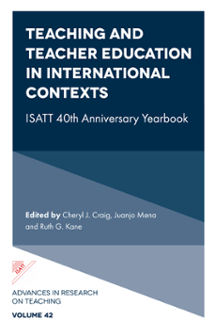
Index
Teaching and Teacher Education in International Contexts
ISBN: 978-1-80455-471-5, eISBN: 978-1-80455-470-8
ISSN: 1479-3687
Publication date: 10 August 2023
Citation
(2023), "Index", Craig, C.J., Mena, J. and Kane, R.G. (Ed.) Teaching and Teacher Education in International Contexts (Advances in Research on Teaching, Vol. 42), Emerald Publishing Limited, Leeds, pp. 329-331. https://doi.org/10.1108/S1479-368720230000042035
Publisher
:Emerald Publishing Limited
Copyright © 2023 Cheryl J. Craig, Juanjo Mena and Ruth G. Kane. Published under exclusive licence by Emerald Publishing Limited
INDEX
- Prelims
- Section 1 Tributes
- Tribute to John Loughran
- Tribute to Jean Clandinin
- Tribute to Geert Kelchtermans
- Tribute to Theo Wubbels
- Tribute to Christopher Day
- Tribute to Judith Warren Little
- Section 2 Teacher Education Reform
- Introduction
- Tensions and Paradoxes in Teaching: Implications for Teacher Education
- Teacher Education Reforms in Kenya: The Past, the Present, and Mapping the Future
- Teacher Education Reform in Scotland
- Teacher Education Reform in the United States: Colliding Forces?
- Innovative Research Training in Higher Education for LSP Teachers: From Institutional Policy to the Development of Custom-Made Projects
- Section 3 School Reform Section
- Introduction
- Listening as a Basis of Reforming Schools in Asia: From Hostility to Trust
- School Reform in South Africa: A Struggle for Mobility
- “Data Is [G]od”: The Influence of Cumulative Policy Reforms on Teachers' Knowledge in an Urban Middle School in the United States
- Principals' Views in a Context of Reform: The Case of School Curriculum Policy in Portugal
- Section 4 Preparing Teacher Educators (InFo-TED) SECTION
- Introduction
- Looking Back and Looking Forward at InFo-TED—Reflecting on Purpose, Progress, and Challenges
- InFo-TED, North America: Addressing a Problem of Practice
- InFo-TED: Bringing Policy, Research, and Practice Together Around Teacher Educator Development
- Section 5 Partnerships
- Introduction
- Communities of Practice With Visiting Scholars
- Collaborative Reflection, Knowledge, and Growth: Exploring Ongoing Teacher Learning Within Knowledge Communities
- Multinational Policy Analyses: Third Time Around
- International Forum on Teacher Education as an Educational Research Partnership
- Cultivating Teacher Resilience Through Intercultural Interaction and Collaboration
- Afterword
- Index